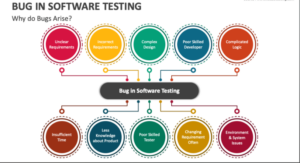Before starting the actual topic let us know about the daily chores activities like:
- Suppose we want to pay electricity bill.
- Need to communicate with my manager and submit my reports urgently.
- Want to buy new clothes for my kid, but I don’t have the time to go to a store.
- If its 10 PM and running late for my flight. Where is the cab?
How to perform these activities within a fraction of second, the answer that comes to our mind is By a Smartphone, by an internet activity, a mobile app. This makes us realise the importance of mobile app. Everything is done through a smart phone smartly. To have successful mobile app, we need to understand in detail that developing the mobile app is not the only requirement but a mobile app needs to be tested in detail in order to get the good feedback from the customers.
The different testing that are done to mobile devices are:
- Device Testing: This testing is done to make sure the quality of the mobile device. Testing contains hardware and software testing for a mobile.
- Unit testing: Unit testing is a test phase when components of a mobile device development are tested by the developer. It will contain hardware testing, software testing and mechanical testing.
- Factory testing: This is a kind of sanity check on mobile devices. It is conducted automatically to verify that there are no defects brought during the manufacturing. It mainly includes the testing like:
- Mobile application testing
- Hardware Testing
- Battery testing
- Signal receiving
- Network testing
- Protocol testing
- Mobile games testing
- Mobile software compatibility testing.
The Functional Testing of Mobile Application:
The functional testing of mobile applications is a procedure of testing functionalities of mobile applications like user interactions as well as testing the transactions that users might perform. The main goal of functional testing is to make sure the quality, meet the expectations, reduce risk and ensure customer satisfaction.
The different factors which are relevant in functional testing are:
- The type of application based upon business functionality usage.
- The target audience type.
- The Distribution channel which is used to spread the application.
The fundamental test scenarios in the functional testing can be considered as:
- To validate all the required mandatory fields that are working as required.
- To validate, the mandatory fields are displayed on the screen in a distinctive way than the non-mandatory fields.
- To verify whether the application works as per the requirement whenever the application starts.
- To verify whether the application goes into minimised mode whenever there is an incoming call.
- To verify whether the phone is ready to store, process and receive SMS whenever the app is running.
- To validate the application resumes at the last operation in case of a hard reboot or may be system crash.
Why mobile testing is important?
Assume yourself, as a user trying out a new mobile app. If the app takes too long to download, likelihood is that you would possibly exit before even using it. If it functions well on Android but the UI is funky on your iOS devices, you may also drop out. If the app is repeatedly crashing while in use, you may discontinue using it. Thoroughly testing an app would eliminate risks like these and increase the app retention rate.



























12 Responses
Mobile Testing:
The different testing that are done to mobile devices are:
1. Device Testing: This testing is done to make sure the quality of the mobile device. Testing contains hardware and software testing for a mobile.
2. Unit testing: Unit testing is a test phase when components of a mobile device development are tested by the developer. It will contain hardware testing, software testing and mechanical testing.
3. Factory testing: This is a kind of sanity check on mobile devices. It is conducted automatically to verify that there are no defects brought during the manufacturing. It mainly includes the testing like:
1. Mobile application testing
2. Hardware Testing
3. Battery testing
4. Signal receiving
5. Network testing
6. Protocol testing
7. Mobile games testing
8. Mobile software compatibility testing.
The Functional Testing of Mobile Application:
The functional testing of mobile applications is a procedure of testing functionalities of mobile applications like user interactions as well as testing the transactions that users might perform.
The different factors which are relevant in functional testing are:
1. The type of application based upon business functionality usage.
2. The target audience type.
3. The Distribution channel which is used to spread the application.
The fundamental test scenarios in the functional testing can be considered as:
1. To validate all the required mandatory fields that are working as required.
2. To validate, the mandatory fields are displayed on the screen in a distinctive way than the non-mandatory fields.
3. To verify whether the application works as per the requirement whenever the application starts.
4. To verify whether the application goes into minimised mode whenever there is an incoming call.
5. To verify whether the phone is ready to store, process and receive SMS whenever the app is running.
6. To validate the application resumes at the last operation in case of a hard reboot or may be system crash.
Testing on mobile devices generally involves:
– Device Testing(to test device quality),
– Unit testing(testing mobile device component)
– and Factory testing (sanity check on device)
Essential testing on mobile devices includes:
Mobile application testing, Hardware Testing, Battery testing
Signal receiving, Network testing, Protocol testing
Mobile games testing, Mobile software compatibility testing.
Test scenarios to consider for the functionality testing of mobile devices:
To validate
– all the required mandatory fields that are working as required.
– the mandatory fields are displayed on the screen.
– application works as per the requirement whenever the application starts.
– the application goes into minimized mode whenever there is an incoming call.
– the device is ready to store, process and receive SMS/MMS whenever the app is running.
– the application resumes at the last operation in case of a hard reboot/system crash.
Mobile testing for the device is critical to ensure that the mobile app is robust and works on different mobile OS devices consistently.
Mobile Testing is very much important because every one have a smart phone and do number of tasks in mobile app. when number of user use it , it should be standard and good quality with security. For all this testing should be done before it goes to users hand.
Testing that are done on mobile device are
System testing, unit testing and factory testing
The functional testing in mobile app is done to make sure quality, meet the expectation, reduce risk and customer satisfact
Mobile testing:
The different testing that are done to mobile devices are:
1.Device Testing: This testing is done to make sure the quality of the mobile device. Testing contains hardware and software testing for a mobile.
2.Unit testing: Unit testing is a test phase when components of a mobile device development are tested by the developer. It will contain hardware testing, software testing and mechanical testing.
3.Factory testing: This is a kind of sanity check on mobile devices. It is conducted automatically to verify that there are no defects brought during the manufacturing.
The Functional Testing of Mobile Application:
The functional testing of mobile applications is a procedure of testing functionalities of mobile applications like user interactions as well as testing the transactions that users might perform.
The different factors which are relevant in functional testing are:
1.The type of application based upon business functionality usage.
2.The target audience type.
3.The Distribution channel which is used to spread the application.
If the app is repeatedly crashing while in use, you may discontinue using it. Thoroughly testing an app would eliminate risks like these and increase the app retention rate.
The smart phones and applications are useful in all the walks of life these days. So in order to get customers to use it and get good reviews, its very important to test all the apps and rigorously.
there are no defects brought during the manufacturing.
FUNCTIONAL TESTING : Is a procedure of testing functionalities to ensure that all interactions between the customers and the systems work properly.
It ensures functionalities like :
1. validate all required mandatory fields are working as required
2. to validate mandatory and non mandatory fields are distinctly mentioned
3. application works as per requirement
4. application goes into minimized mode when there is an incoming call
5. phone is ready to store, process and receive SMS whenever app is running
6. the application resumes last application during a hard reboot
Mobile testing consist of device testing (Hardware & software), Unit testing ( Hardware testing, software testing done by developer &Mechanical testing ) Factory testing conducted automatically to verify there are no defects during manufacturing .
The Functional Testing of Mobile Application: The main goal of functional testing to get the quality reassurance.
Here we talk about,
Why we go for Mobile Testing?
Different testing done in mobile devices.
Functional Testing of Mobile Application.
different testing are done in mobile dives are
device testing: to check the quality
unit testing: it is a test phase
factory testing: this is a sanity check
in mobile testing we use some testing like : mobile application testing, hardware testing, battery testing, signal receiving testing, network testing, protocol testing, mobile games testing, mobile software compatibility testing.
the main goal of functional testing is to make sure the quality, meet the expectations.
the fundamental test scenarios in the functional testing as;
validate all the required mandatory fields
validate the mandatory fields are displayed on the screen
verify the application works as per the requirement
verify the application goes into minimised while incoming call
verify whether the phone have valid memory or not
verify the application it can shows the last operation
mobile testing is important to release the product into the market, testing is imp to eliminate risks and increase the retention rate.
Mobile Testing is very much important because every one have a smart phone and do number of tasks in mobile app. when number of user use it , it should be standard and good quality with security. For all this testing should be done before it goes to users hand.
Testing that are done on mobile device are
System testing, unit testing and factory testing
The functional testing in mobile app is done to make sure quality, meet the expectation, reduce risk and customer satisfact
The different testing that are done to mobile devices are:
Device Testing: This testing is done to make sure the quality of the mobile device. Testing contains hardware and software testing for a mobile.
Unit testing: Unit testing is a test phase when components of a mobile device development are tested by the developer. It will contain hardware testing, software testing and mechanical testing.
Factory testing: This is a kind of sanity check on mobile devices. It is conducted automatically to verify that there are no defects brought during the manufacturing.
It mainly includes the testing like:
-Mobile application testing
-Hardware Testing
-Battery testing
-Signal receiving
-Network testing
-Protocol testing
-Mobile games testing
-Mobile software compatibility testing.
Mobile Testing:
The different testing that are done to mobile devices are:
1. Device Testing: This testing is done to make sure the quality of the mobile device. Testing contains hardware and software testing for a mobile.
2. Unit testing: Unit testing is a test phase when components of a mobile device development are tested by the developer. It will contain hardware testing, software testing and mechanical testing.
3. Factory testing: This is a kind of sanity check on mobile devices. It is conducted automatically to verify that there are no defects brought during the manufacturing. It mainly includes the testing like:
1. Mobile application testing
2. Hardware Testing
3. Battery testing
4. Signal receiving
5. Network testing
6. Protocol testing
7. Mobile games testing
8. Mobile software compatibility testing.
The Functional Testing of Mobile Application:
The functional testing of mobile applications is a procedure of testing functionalities of mobile applications like user interactions as well as testing the transactions that users might perform.
The different factors which are relevant in functional testing are:
1. The type of application based upon business functionality usage.
2. The target audience type.
3. The Distribution channel which is used to spread the application.
The fundamental test scenarios in the functional testing can be considered as:
1. To validate all the required mandatory fields that are working as required.
2. To validate, the mandatory fields are displayed on the screen in a distinctive way than the non-mandatory fields.
3. To verify whether the application works as per the requirement whenever the application starts.
4. To verify whether the application goes into minimized mode whenever there is an incoming call.
5. To verify whether the phone is ready to store, process and receive SMS whenever the app is running.
6. To validate the application resumes at the last operation in case of a hard reboot or may be system crash.
Everything is done through a smart phone smartly. Few of the testing that are done to mobile devices are: device testing, unit testing and factory testing.
The functional testing of mobile applications is a procedure of testing functionalities of mobile applications like user interactions as well as testing the transactions that users might perform. The main goal of functional testing is to make sure the quality, meet the expectations, reduce risk and ensure customer satisfaction
The different factors which are relevant in functional testing are:
1. The type of application based upon business functionality usage.
2. The target audience type.
3. The Distribution channel which is used to spread the application.
Thoroughly testing an app would eliminate crashes, reduce loading time to download app, not function on device and increase the app retention rate.